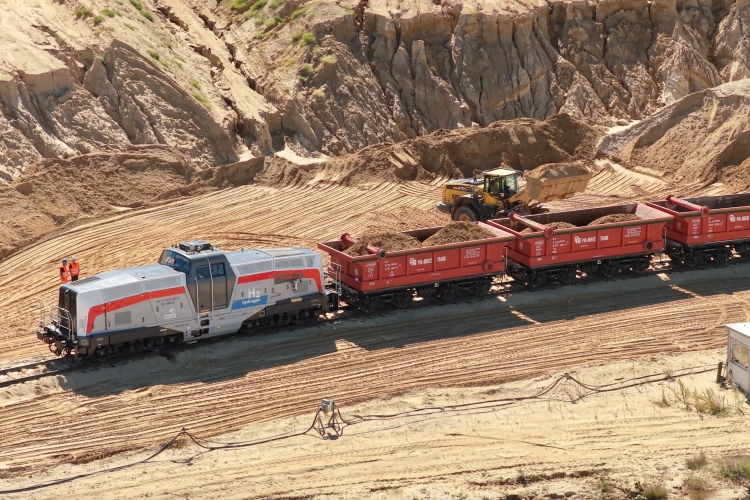Hydrogen revolution in Lower Silesia
- Oprac. M.K.
- Kategoria: English zone
During a press conference held in Polkowice, hydrogen rail tests in Lower Silesia were summarized. The event was attended by representatives of the Marshal’s Office of the Lower Silesian Voivodeship, Koleje Dolnośląskie, Pol-Miedź Trans and KGHM Polska Miedź S.A., as stakeholders in hydrogen rail technology, as well as PESA Bydgoszcz – the manufacturer of Poland’s first and one of Europe’s first hydrogen locomotives.
The energy transition is becoming an inevitable path of development for modern regions. Hydrogen plays a key role here, with the potential to revolutionize public transport. With its strong scientific and industrial base, developed transport infrastructure and dynamic local governments, Lower Silesia has the chance to play a pivotal role in this revolution.
Hydrogen-powered tests
Koleje Dolnośląskie opened the hydrogen tests by launching the first scheduled train powered by this fuel of the future. Four trains operated on the Jelenia Góra – Karpacz route last Wednesday, generating strong public interest.
Railways are the transport lifeblood of the region. If we want to encourage residents to use trains, we need to keep improving our transport offering. Electrification of railway lines is a government task, but we are not resting on our laurels and are also looking for modern, environmentally friendly solutions ourselves. That is why Koleje Dolnośląskie has started testing hydrogen-powered locomotives - said Paweł Gancarz, Marshal of Lower Silesia, during the launch.
Later, during the Economic Forum, one of the debates was devoted to hydrogen propulsion. Representatives of the Ministry of Climate and Environment, as well as the authorities of the Lower Silesian Voivodeship, were unanimous in their support for its use in rail transport.
The hydrogen locomotive made an incredible impression on the passengers who took part in this historic event. Hydrogen-powered vehicles are already running in Germany, and many countries in Europe are testing them. When this fuel of the future becomes a permanent part of rail transport, we will always remember this historic moment when Koleje Dolnośląskie operated the first such scheduled train. By the end of September, we will have analyses of this journey, which will help us take further steps on hydrogen. Of course, we are already exploring co-financing opportunities for such vehicles - said Damian Stawikowski, CEO of Koleje Dolnośląskie, during the debate.
Promising test results
At Monday’s conference in Polkowice, representatives of Pol-Miedź Trans, KGHM Polska Miedź and PESA emphasized that the hydrogen locomotive tests had delivered very promising results.
The past few days in Lower Silesia have been a very demanding test for our hydrogen locomotive and the entire team. Both the route to Karpacz and operations on KGHM premises set the bar high, but the Sm42-6Dn performed very well. We see tremendous potential for cooperation with our partners, and I believe the time for rail hydrogenization in Lower Silesia is approaching. The results of our tests will help our regional partners make decisions in this regard - said Krzysztof Zdziarski, CEO of PESA Bydgoszcz.
An important declaration was made by Piotr Stryczek, Vice President for Corporate Affairs at KGHM Polska Miedź S.A. It is possible that within a few years the copper company’s rolling stock will be hydrogen-based.
The tests conducted in the Copper Basin confirmed that investing in this technology makes sense. They showed that hydrogen fuel is the fuel of the future. That is why green energy will occupy an important place in our Group’s energy strategy - announced Piotr Stryczek, Vice President for Corporate Affairs, KGHM Polska Miedź S.A.
A pioneering railway operator
Koleje Dolnośląskie is the first railway operator in Poland to carry passengers in carriages hauled by a hydrogen locomotive. On a daily basis, the company operates railway routes in three countries and three voivodeships, and starting in December will also serve the Opole Voivodeship as the fourth. Its trains cover over 15 million kilometers annually, and indications are that in the future they may also operate battery- or hydrogen-powered rolling stock.
Since 2019, PESA has consistently pursued projects for zero-emission hydrogen rail vehicles. The company is currently investing in modern facilities prepared for the production of hydrogen-powered vehicles and is also developing a passenger vehicle powered by both electric traction and hydrogen fuel cells, dedicated to servicing regional connections.
Source: PESA




